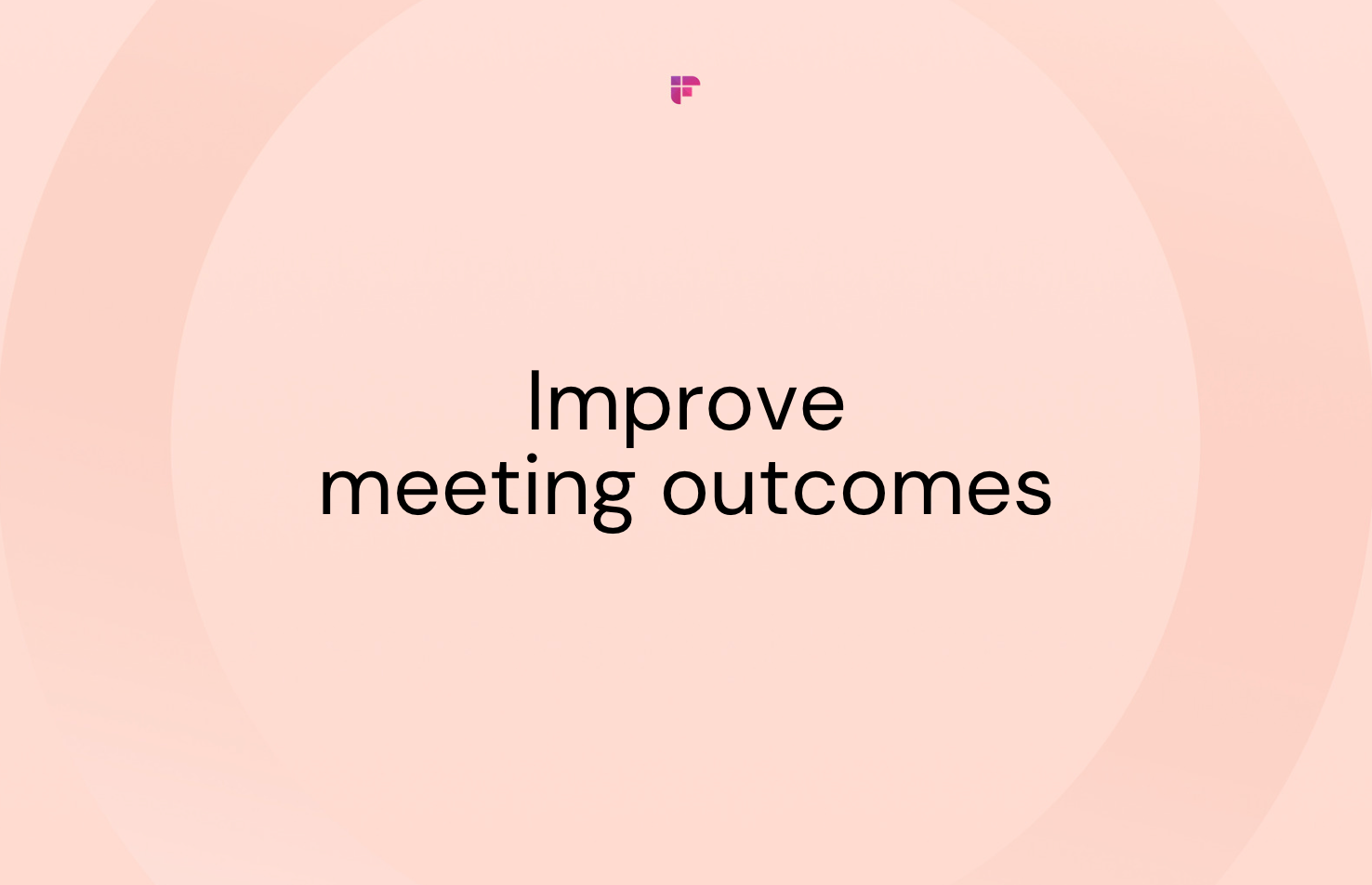Ah, meetings—the necessary evil of the modern workplace. They are often time-consuming, unproductive, and, dare we say, boring.
A survey by Harvard Business Review found that 71% of senior managers felt that meetings were unproductive and inefficient. And according to an Atlassian study, 91% of employees daydream during meetings, 39% have fallen asleep, and 45% have felt overwhelmed.
So how do you turn these “yawn-a-thons” into power sessions? In other words, how do you improve meeting outcomes? Continue reading to find out.
What is a meeting outcome?
If the meeting were an exam, the outcome would be the final result.
Just as you prepare for an exam, you prepare for a meeting too. You create a meeting agenda, write down topics to discuss, and share them with the team. It gives the meeting a sense of direction, lessens the chances of distraction, and improves the chances of getting the desired outcomes.
A meeting outcome (or output) can have many forms. Here are a few examples:
- Decide a new action plan
- Changes to your current approach to boost productivity
- Revised resource allocation
- Conflict resolution
- Give/receive feedback and appreciation
- Explore potential areas of improvement
It’s essential to align the meeting outcomes with your organization’s goals and objectives.
What are great meeting outcomes (with examples)?
Better transparency of the objective
- Transparency builds trust and helps everyone to rely confidently on one another.
- In the meeting, you learn your expected role and how your contributions fit the bigger picture. This clarity helps eliminate confusion and prevents misunderstandings that can lead to miscommunication or wasted efforts.
Meeting outcome example:
A startup decides to expand and restructure. After the restructuring, they observe a substantial dip in productivity. So, they host an all-hands meeting.
The company openly discusses restructuring, expansion plans, and new changes. It makes things transparent and allows people to adjust their roles and responsibilities accordingly.
A clear action plan
- An action plan contains the path the team needs to take to achieve the objectives discussed in the meeting.
- You select the team members and decide on specific tasks and timelines, which allows you to track progress and enhances accountability and productivity.
Meeting outcome example:
A SaaS company aims to launch a new product in 30 days. It’s been two months, and the product isn’t half finished. The manager decides they need a better action plan and calls for a meeting.
The team discusses the current progress and breaks the project into smaller milestones. Each member is assigned tasks with a timeline after the meeting.
💡 Fireflies Tip
Use Fireflies Smart Search feature to quickly review all action items and tasks discussed during online meetings.
Everyone is on the same page
- Having everyone on the same page in a meeting boosts productivity and ensures all team members understand the concerns discussed.
- The team can work together to resolve doubts, disagreements, or any pressing questions.
- Being on the same page promotes collaboration and helps teams achieve their objectives more effectively.
Meeting outcome example:
A company's design and marketing team is discussing a new campaign. They agree that the initial designs are a bit too much for the target audience.
They brainstormed ideas for adjusting the campaign and, with mutual consensus, agreed to rework the designs.
Everyone feels appreciated and valued
- A meeting should always end with everyone feeling appreciated.
- Do it by acknowledging the contributions, showing gratitude, and giving credit where it's due.
- It creates a positive and encouraging environment where everyone feels energized and motivated.
Meeting outcome example:
A company's sales were up by 30% compared to the last quarter. To celebrate this milestone, they host a townhall.
The manager thanks every contributor, while the members share stories of having each other’s backs during the tough times. The meeting ends positively, with all the employees feeling valued and recognized.
Every opinion is heard and accounted for
- It’s ok to have conflicting views in the meeting. But what's not ok is when people aren't allowed to speak their minds. Therefore, let everyone express their thoughts openly.
- They may have a new idea or a pressing issue at hand. Take everything they say into consideration.
- It promotes inclusivity and diversity of thought, encouraging a culture of open communication.
Meeting outcome example:
Two marketing team members disagree regarding their content strategy in a meeting. One wants Instagram to be their core focus, and the other wants to use Twitter.
The manager hears them both and tries to find common ground. Finally, they use Twitter to promote their blogs and Instagram for influencer marketing. That’s a great meeting outcome, right?
Everyone gets an opportunity to be better
- If the meeting ends with everyone feeling frustrated, it’s not a positive meeting outcome. Your team may need more confidence (or skills) to get things done.
- Encourage an atmosphere that builds the confidence of your team members. Identify the weak links and work towards a fix.
- If someone needs to improve somewhere, provide them with that opportunity to learn and be better.
Meeting outcome example:
A customer service team reviews its performance metrics in a meeting. The data shows that their emails weren’t effective. Each team member shares their ideas and agrees that sending more personalized follow-ups is the solution.
However, some reps aren’t confident in writing personalized emails—they’ve never done it before. The manager assures them of proper training, and the team promises to provide all the help they can.
Everyone gets to ask questions
- The meeting outcome can be better if people ask more questions. It means they are comfortable communicating openly.
- Set aside a few minutes for open-ended questions and discussion.
- Actively listen to the questions, and answer with the intent to clear any confusion.
Meeting outcome example:
A project manager decides to change strategy in the middle of the project. The team was comfortable with the previous strategy and didn’t appreciate the sudden change.
During the meeting, the team asks questions to understand the changes. The project manager actively listens to all concerns and convinces them that the new strategy will reduce the project’s TAT by 20% and improve productivity.
3 Ways to improve meeting outcomes
Improve your meeting outcome by following these three simple steps.
Have a well-planned meeting
- Without a clear purpose or agenda, a meeting can quickly go off-track and fail to produce meaningful results.
- Before you schedule the meeting, ensure you have a goal in sight.
- A well-planned meeting always sticks to the meeting agenda.
- Only invite people who are relevant to the meeting.
- Share the agenda with the team before the meeting, giving them time to prepare.
- In the end, take two minutes to recap everything you discussed.
- Send meeting minutes or notes outlining the action items and next steps.
Set the meeting when everyone is comfortable
- Be aware that availability is an essential aspect of any successful meeting.
- Talk to the team before setting the meeting. If your team is spread across different time zones, find a time that works for the majority.
- Avoid scheduling meetings during lunch breaks or outside regular working hours unless necessary.
- Uncontrollable circumstances might lead to meeting cancellations. Write an apologetic email and reschedule at the next convenient time.
Follow-up on action items
- The outcome of the meeting can exceed the meeting.
- To improve, have a follow-up of every action item you discuss.
- Track progress and make it transparent.
- Are they on schedule or behind? Are they stuck somewhere or need some help? Keep the communication going.
To wrap things up
Improving meeting outcomes is easy. The key lies in keeping things transparent and accessible for everyone.
Set clear expectations, have an agenda, and make sure you don’t get distracted in the meeting. Urge everyone to participate and stick to the action plan that will help you achieve your goal. That’s it.
With that, you’ll be able to gain better outcomes from every meeting you attend or organize.






